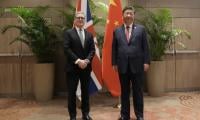New PTV chairman’s announcement runs counter to PTI manifesto
ISLAMABAD: The newly-appointed chairman of Pakistan Television (PTV) Naeem Bukhari's categorical statement not to give any airtime to the opposition on the state broadcaster runs counter to a commitment made in the Pakistan Tehreek-e-Insaf's (PTI) manifesto.
Bukhari, who is also a noted lawyer, recently said only the government will get coverage on PTV as it is a state-run organisation which would only represent the stance of the government. "I disagree with the declaration; there is a need to build the credibility of the government-run PTV and to have balanced coverage," former Information Minister Javed Jabbar told The News when asked to comment on Bukhari's announcement.
The PTI manifesto had vowed that the Pakistan Broadcasting Corporation (PBC) and PTV would be made autonomous with their own board of governors similar to the BBC model. Javed Jabbar said that it was a moral and ethical, not legal, obligation of the state broadcaster to give reasonable coverage to non-government elements, whether political or not. He said a government was for all the people and not only for those who voted it to power. Therefore, it is required to represent everyone. There are always people who do not share the same views as the government, he said, and noted that the PTI manifesto had not used the word "opposition". The former minister said that there was a difference between state and public broadcasters. In the case of a public broadcaster, the government does not have the sole controlling authority, and it should have a non-government, non-state management structure. PTV, however, remains a state broadcaster. He said the government's view is that its voice is not properly projected on the dozens of private TV channels, and to that extent, it may be justified in its opinion. Javed Jabbar recalled that within 72 hours of becoming the information minister during the first Benazir Bhutto government in the late eighties, he had brought about a radical, 180 degree, change in the coverage on PTV. However, the policy was reversed after four months, as the prime minister decided that it could not be continued.
As a result, he said, he was going to resign as the information minister but he was moved to the science and technology ministry. When this policy had been in force, the opposition's statements, including those of the then Punjab Chief Minister Nawaz Sharif, were included as lead stories in PTV's Khabarnama. Jabbar said he had noticed that some leaders belonging to the opposition parties were being invited to PTV's current affairs programmes over the last few months.
In light of its recent policies, it is instructive to look back at what the PTI manifesto had promised if the party came to power.
The manifesto states on ensuring freedom of the press: "We are committed to maintaining a vigorous free media, which will evolve its own rules to ensure responsible journalism both in the electronic and print media. We will ensure laws for timely implementation of Wage Board decisions and for ensuring that media houses pay journalists their salaries and bonuses on a regular and timely basis. We will also ensure that media owners provide insurance, training and protective cover for their journalists working in conflict zones in particular and in the field in general. The Pakistan Electronic Media Regulatory Authority (Pemra) will be made autonomous so it does not become a political tool in the hands of any government to target the freedom of the electronic media. Government advertisement will be rationalized and not be made a tool to harass or bribe the independent media."
Regardless of Bukhari's assertion and apart from brief interludes when some kind of a balanced coverage was given on PTV, successive governments have used the state broadcaster as their main instrument to highlight their policies, programmes and strategies, and to take on their political rivals.
Earlier, it was reported in the media that the newly appointed chairman of Pakistan Television Naeem Bukhari had hinted at ‘blackout’ of the opposition on PTV.
When a reporter asked the new chairman outside the Supreme Court building if the opposition would be given equal airtime on PTV, Bukhari replied: “Not at all.”
He said PTV was the state-run organisation and it would only represent the stance of the government. “Only government?” asked the reporter. “Yes, only government,” Bukhari said.
-
 'Prince Harry Sees A Lot Of Himself In Brooklyn Beckham'
'Prince Harry Sees A Lot Of Himself In Brooklyn Beckham' -
 Kate Middleton’s Cancer Journey Strengthens Her Commitment To Helping Children
Kate Middleton’s Cancer Journey Strengthens Her Commitment To Helping Children -
 Gaten Matarazzo Compares 'Stranger Things' Ending To 'Lord Of The Rings'
Gaten Matarazzo Compares 'Stranger Things' Ending To 'Lord Of The Rings' -
 Prince Harry Slams Publisher Over 'dirty Trick' Ahead Of Showing Evidence
Prince Harry Slams Publisher Over 'dirty Trick' Ahead Of Showing Evidence -
 Blueface Promises To Change Behaviour If His Ex Comes Back
Blueface Promises To Change Behaviour If His Ex Comes Back -
 Prince Harry Makes Crucial Promise To Meghan Markle Over UK Return
Prince Harry Makes Crucial Promise To Meghan Markle Over UK Return -
 Keir Starmer’s China Visit: UK Follows Mark Carney In Major Reset Of Ties
Keir Starmer’s China Visit: UK Follows Mark Carney In Major Reset Of Ties -
 NASA Celebrates One Year Of Trump’s Second Term With Moon And Mars Achievements
NASA Celebrates One Year Of Trump’s Second Term With Moon And Mars Achievements -
 Chris Pratt Shares Real Thoughts On AI In Film Industry
Chris Pratt Shares Real Thoughts On AI In Film Industry -
 Netflix Disappointed As Meghan Markle’s Series Struggles To Impress
Netflix Disappointed As Meghan Markle’s Series Struggles To Impress -
 Royal Family Announces Death Of Princess: King Releases Statement
Royal Family Announces Death Of Princess: King Releases Statement -
 Sarah Ferguson Will Continue To Be Part Of Andrew's Life
Sarah Ferguson Will Continue To Be Part Of Andrew's Life -
 Google’s Gemini Now Offers Free SAT Prep With Full-length Mock Tests
Google’s Gemini Now Offers Free SAT Prep With Full-length Mock Tests -
 Everything You Need To Know About Macron’s Viral Glasses: Cost, Model, All Details Revealed
Everything You Need To Know About Macron’s Viral Glasses: Cost, Model, All Details Revealed -
 Elon Musk Warns Of AI ‘supersonic Tsunami’: What It Means For Future
Elon Musk Warns Of AI ‘supersonic Tsunami’: What It Means For Future -
 Why Victoria Beckham's Dance Video From Brooklyn's Wedding Won't Be Released
Why Victoria Beckham's Dance Video From Brooklyn's Wedding Won't Be Released



